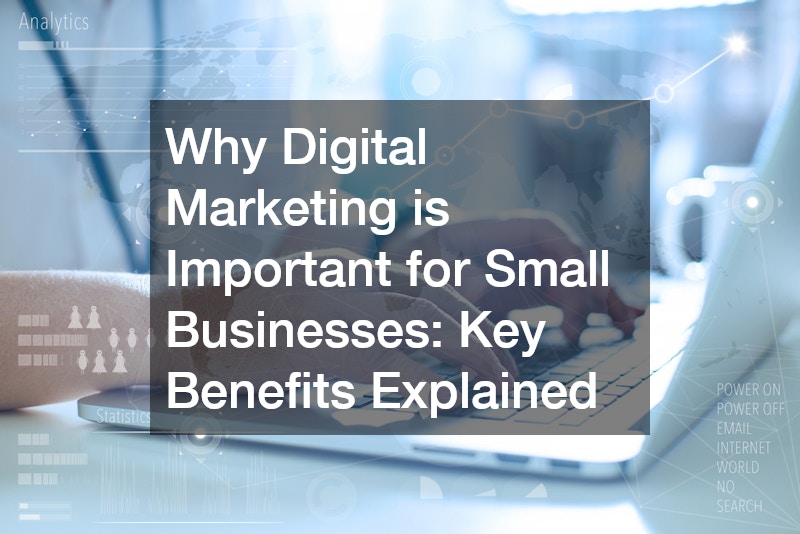Why Digital Marketing is Important for Small Businesses: Key Benefits Explained
In today’s digital age, the success of a business, especially small businesses, largely depends on its online presence. Whether you’re running a local retail store, a restaurant, or offering professional services, digital marketing is no longer optional—it’s a necessity. With increasing competition and changing consumer behavior, small businesses need to leverage digital marketing to stay relevant and thrive in a competitive landscape.
This article explores the importance of digital marketing for small businesses, outlining how it helps them grow, compete, and build sustainable customer relationships.
1. Increased Visibility and Reach
Expanding Your Audience
The most significant advantage of digital marketing is that it allows small businesses to extend their reach beyond the constraints of a physical location. Traditionally, small businesses relied on word-of-mouth and local advertising, but digital marketing enables them to connect with a global audience. With the right strategies, you can reach potential customers who might not have known your business existed.
Social media, search engines, and content marketing platforms offer tools that make it easy to promote your products or services to people who are already looking for what you offer. Paid ads and organic traffic can put your business in front of new customers across the globe, or more importantly, within your local community.
Geotargeting and Local SEO
Local businesses, in particular, can benefit from digital marketing by using local SEO (Search Engine Optimization). By optimizing your online content for local searches, you can attract customers from your community or city. For instance, when someone searches for “best bakery near me” or “plumber in [your city],” local SEO helps ensure your business shows up in the search results. Tools like Google My Business allow you to appear in relevant map searches, making it easy for nearby customers to find and contact you.
2. Cost-Effective Marketing
Lower Advertising Costs
Compared to traditional forms of marketing such as TV ads, radio spots, or print media, digital marketing is much more cost-effective. Small businesses typically operate on tight budgets, and digital marketing provides a way to get high-quality exposure without breaking the bank. Even with a small budget, businesses can run successful ad campaigns on platforms like Google Ads, Facebook, or Instagram.
Additionally, many digital marketing strategies such as SEO, content marketing, and organic social media marketing are incredibly affordable. Once your content is created and posted, it can continue to drive traffic and generate leads without additional costs.
Higher ROI (Return on Investment)
One of the reasons digital marketing is so important for small businesses is that it delivers a high ROI. With digital marketing, you can track every dollar spent and measure its effectiveness. Whether you’re running paid advertising campaigns or using email marketing, analytics tools allow you to monitor how well your campaigns are performing, enabling you to make adjustments and optimize results. This ensures that you get the most value for your investment.
3. Improved Customer Engagement and Interaction
Two-Way Communication
Unlike traditional marketing methods, digital marketing allows for two-way communication between businesses and their customers. Social media platforms like Facebook, Instagram, and Twitter are not just for advertising; they serve as platforms for engagement. You can respond to customer inquiries, address concerns, and interact with your audience in real-time.
This increased level of engagement fosters trust and loyalty, making your customers feel valued and heard. Answering questions quickly, offering support, or even sharing behind-the-scenes content can help deepen customer relationships, which is essential for small businesses aiming to build long-term customer loyalty.
Building Community
Digital marketing provides an opportunity to build an online community around your brand. Whether it’s through social media groups, content sharing, or email newsletters, small businesses can create a community of customers who are not just buyers but advocates for your brand. A loyal community can be a powerful marketing tool as members share your content, recommend your services, and participate in discussions around your brand.
4. Precise Targeting of the Ideal Audience
Targeted Advertising
One of the most powerful features of digital marketing is its ability to target specific demographics. Whether it’s age, location, gender, interests, or online behavior, digital marketing platforms allow you to reach the people most likely to buy from your business. Small businesses can use this precision targeting to avoid wasting resources on audiences that aren’t interested in their products or services.
For instance, platforms like Facebook and Instagram offer advanced targeting options that allow you to focus on users who have shown interest in your type of business or product category. You can run ads directly to individuals based on their online behavior, such as those who have visited your website or engaged with your content in the past.
Retargeting Potential Customers
In addition to targeting new customers, digital marketing allows for retargeting, which involves reaching people who have interacted with your business but haven’t made a purchase. By using tracking pixels or cookies, you can show ads to people who visited your website, reminding them of your services or offering discounts to encourage them to return.
This retargeting strategy is effective because it engages users who are already familiar with your business and more likely to convert, helping increase sales and customer acquisition.
5. Data-Driven Decision Making
Analytics and Tracking
One of the most important aspects of digital marketing is the ability to collect data and track results. Platforms like Google Analytics, Facebook Insights, and various other marketing tools provide detailed reports on how your campaigns are performing. This includes information on your website traffic, conversion rates, audience engagement, and more.
For small businesses, having access to this data allows for smarter decision-making. You can see which marketing strategies are working and which need to be adjusted. This ensures that your marketing budget is being spent in the most effective way possible.
A/B Testing and Optimization
Digital marketing platforms also allow you to conduct A/B testing. This involves testing two or more variations of an ad, landing page, or email to see which one performs better. By optimizing the content based on real-world data, small businesses can continually improve their marketing efforts and increase their chances of success.
6. Increased Sales and Revenue Growth

Lead Generation
The primary goal of digital marketing is to drive conversions and generate leads. By using strategies like content marketing, email marketing, and pay-per-click (PPC) advertising, small businesses can guide potential customers through the buying process and encourage them to make a purchase. Every piece of content, ad, or social media post can serve as part of a larger strategy designed to increase sales and grow revenue.
E-commerce Integration
For businesses that sell products online, digital marketing is crucial to driving traffic to e-commerce websites. Platforms like Google Ads and Facebook Ads can drive targeted traffic to your online store, while content marketing and SEO can improve organic search rankings, ensuring that potential customers can find your products easily.
With the rise of e-commerce and online shopping, small businesses must use digital marketing to compete with larger brands and capture their share of the market.
7. Building Brand Awareness and Trust
Establishing an Online Presence
Having a strong online presence is vital for building brand awareness. Whether it’s through a company website, social media, or blogs, digital marketing allows small businesses to establish themselves as industry leaders. By consistently producing valuable and engaging content, small businesses can build trust and credibility with their target audience.
Social Proof and Reviews
Customers today rely heavily on online reviews and testimonials when making purchasing decisions. Digital marketing provides small businesses with the platform to showcase positive customer experiences and build social proof. A strong presence on review sites like Google, Yelp, and social media platforms can improve your reputation and encourage more people to choose your business over competitors.
8. Staying Competitive with Larger Businesses
Leveling the Playing Field
One of the most compelling reasons why digital marketing is important for small businesses is that it allows them to compete with larger companies. In the past, large corporations had the advantage of bigger marketing budgets, but digital marketing has leveled the playing field. Small businesses can use affordable digital tools and platforms to reach their target audience just as effectively as bigger companies.
Niche Marketing
Digital marketing also allows small businesses to target niche markets. By focusing on a specific audience segment, you can tailor your marketing efforts to the unique needs of that group, offering personalized content and experiences. This focus on niche marketing can give small businesses a competitive edge by allowing them to build deeper connections with their audience, which larger corporations may struggle to achieve.
9. Adapting to Consumer Behavior
Mobile and Social Media Usage
More than ever, consumers are using mobile devices and social media platforms to research products and services before making a purchase. In fact, 82% of smartphone users use their phones to research products online before buying them in-store. For small businesses, having a strong digital marketing strategy ensures that they are visible on these platforms, capturing the attention of consumers who are already looking for what they offer.
By optimizing your website for mobile, creating mobile-friendly ads, and staying active on social media, your business can meet customers where they are, increasing your chances of converting them into paying customers.
10. Continuous Learning and Improvement
Flexibility and Adaptability
Digital marketing allows small businesses to remain flexible and adaptable. As customer preferences, technology, and market trends change, digital marketing strategies can be easily adjusted. Whether it’s updating your website, launching a new campaign, or shifting focus from one social media platform to another, small businesses can respond quickly to changes in the market.
This adaptability is critical for businesses looking to stay competitive and relevant in today’s fast-paced digital world.
Conclusion
Digital marketing is crucial for the growth and success of small businesses. It provides a cost-effective, measurable, and highly targeted way to reach new customers, engage with your audience, and compete with larger businesses. By leveraging the power of SEO, social media, content marketing, and paid advertising, small businesses can not only survive but thrive in an increasingly digital marketplace.
Investing in digital marketing allows small businesses to expand their reach, build brand loyalty, and ultimately increase sales, ensuring a successful future in today’s competitive environment.
